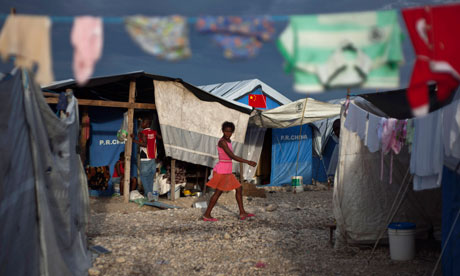We spend $10bn a year on humanitarian emergencies, but most projects are run without asking how beneficiaries feel about them

Lord Ashdown's review of how the UK responds to humanitarian emergencies points to a major shortcoming in today's humanitarian aidsystem: the absence of a systematic effort to assess whether beneficiaries are satisfied with the efforts made on their behalf by UN agencies and NGOs.
Over the past five years, we have seen a marked increase in the focus on accountability in what is now a $10bn a year humanitarian industry. But there is no systematic approach to assessing humanitarian operations through the eyes of recipients. Running aid programmes without understanding how beneficiaries feel about them is to ignore the simplest test of client satisfaction. It is amazing that donors have been willing to make funding decisions without any customer input for as long as they have.
As we see in north Africa and Asia, many push factors continue to drive humanitarian assistance – from natural disasters to global pandemics, climate-induced population displacement, war and food insecurity. These disasters have given rise to a four-fold increase in humanitarian funding since 2000 and a concomitant demand for greater accountability. Yet without the perspective of the beneficiaries, it is hard to find out whether claims about results are borne out by what is being done to help ordinary people caught up in extraordinary events.
In response, a lot of effort has gone into improving the scrutiny of humanitarian operations, and learning lessons for the future. For the most part, though, we still depend on humanitarian agencies to provide the requested data on health, nutrition and other indices of impact. Some donors do undertake their own evaluations of things they have funded – but it's rare that we hear directly from those affected about whether needs are being met, if they were consulted, or whether they are being adequately protected.
Several humanitarian NGOs have signed up to standards of accountability to beneficiaries. This is an important step, but there is a difference between declarations of intent and actual practice on the ground. We must also regularly ask those affected if they are safe, fed and sheltered – and how they feel about their future prospects.
To respond to Lord Ashdown's challenge we need a new effort, one that completes the circle of evaluation by going straight to the beneficiaries. Regular information on citizen's perceptions is available in most high-income and some middle-income states, but only rarely is it gathered from refugee camps and displaced people shelters.
Yet polling surveys and focus groups are cheap, and can be used frequently. The digital revolution extends the range of these tools and makes it possible to measure perceptions very quickly. Mobile phones are already being used to monitor development projects in the Democratic Republic of the Congo – checking if teachers turn up to school, or clinics are stocked with basic supplies. Also in DRC, an experiment launched by Mobile Accord, a mobile applications service provider, with Vodacom Congo and the World Bank, used mobile phones to carry out a nationwide survey of people's perceptions of their security and broader wellbeing. The level of opt-in was impressive, with more than 100,000 people regularly taking part over an eight-week period.
Care International saw the same enthusiasm when it placed suggestion boxes in displaced people's camps in Haiti last year. Soon they were stuffed with messages from people living in the camps, offering lots of smart ideas – as well as hard-to-meet demands.
Eliciting feedback is one thing; responding to it adequately is another. But these examples underline the importance, as well as the feasibility, of checking the performance of humanitarian programmes against the perceptions of those on the receiving end of international aid.
What is missing from the many evaluation reports in the inboxes of humanitarian agencies and donors are independent and systematic assessments based on feedback from beneficiaries themselves. Capturing their views would complement and give context to conventional data-driven assessments. It would ensure that people in need of humanitarian assistance and protection are better served, and that the resources intended to help them are better used.
What is more, it would increase the credibility, and thus attractiveness to potential donors, of those humanitarian agencies that can show they are doing what their beneficiaries need them to do.
• Nicholas van Praag is an adviser to the 2011 World Development Report on conflict and development, due to be published next month






















No comments:
Post a Comment